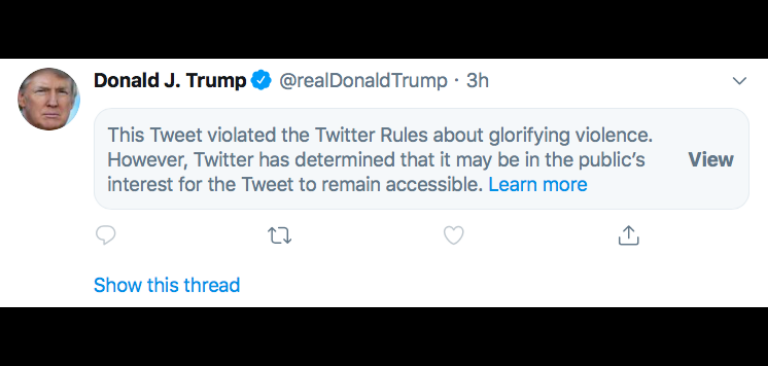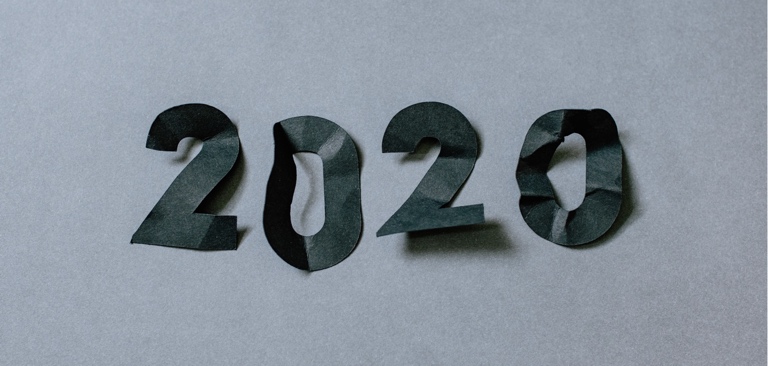2020 was a chilling year for online censorship and the erosion of civil liberties. The Big Tech censorship surrounding the 2020 US presidential election was so pervasive that it was catapulted into the mainstream, the coronavirus ushered in a new wave of mass censorship and surveillance, and Big Tech normalized the censorship of the President.
These examples alone represent a never-before-seen level of online censorship and surveillance yet they’re only scratching the surface when it comes to the level of censorship and surveillance that has manifested across Big Tech platforms this year.
Coronavirus censorship

The coronavirus was used by governments and Big Tech companies around the world to usher in mass censorship of virus-related discussions.
This censorship began in China with the Chinese Communist Party (CCP) threatening citizens with jail time if they dared to share coronavirus news that didn’t come from state-run media, arresting Dr. Li Wenliang for predicting the coronavirus epidemic, and hiring over 1,000 censors and propagandists to tackle what it deemed to be “misinformation.”
However, this authoritarian censorship swiftly expanded beyond China and all of the major Big Tech companies started to clamp down on what their users are allowed to say about the coronavirus. Posts questioning the effectiveness of masks, lockdowns, vaccines, and the advice of the World Health Organization (WHO), were some of the many coronavirus-related topics that were censored by the tech giants this year. Doctors who advocated for the drug hydroxychloroquine were also censored en-masse by Big Tech companies.
While most users of these platforms were subject to censorship when they attempted to discuss the coronavirus, CCP propaganda about the virus was consistently given a pass, particularly on Twitter.
Governments outside of China also mobilized to censor coronavirus conversations. In India, citizens were arrested for sharing so-called coronavirus misinformation on WhatsApp. And in the UK, Big Tech companies teamed up with the government to censor vaccine-skeptic content and Members of Parliament (MPs) called for the censorship of what they deemed to be coronavirus misinformation.
The official justification for this sweeping censorship was to remove “harmful misinformation” about the pandemic but the end result was that citizens and users of social media platforms who attempted to challenge, question, or dispute pre-approved coronavirus talking points and measures were silenced.
Coronavirus surveillance

Not only did the coronavirus lead to an unprecedented year of online censorship but it also caused never-before-seen levels of mass surveillance.
Before this mass surveillance became a reality, several public figures warned that governments would use the coronavirus as an excuse to crush civil liberties and seize people’s rights. But these warnings were dismissed as conspiracy theories and censored.
By the end of the year, numerous Western nations had implemented invasive surveillance and China social credit style regimes. Contact tracing apps and associated contact tracing laws, medical surveillance tech, and coronavirus passports were some of the many systems and tools that were introduced throughout the year to gather data on citizens.
Sometimes these coronavirus surveillance measures were mandated by law. However, most of the surveillance was enforced by corporations who forced their customers to download tracking apps to enter their premises or use their services.
Corporations and governments pushing this mass coronavirus surveillance insisted that it would help to control the coronavirus. But reports about the underlying technology revealed that not only was it often inaccurate but the data was sometimes being passed on to third parties.
Censorship of President Trump and politicians

Before 2020, the idea that any politician would be censored by Big Tech companies was unthinkable. Yet by the end of the year, not only had multiple politicians been censored, but the President of the United States had been censored hundreds of times.
The censorship of President Trump began in May 2020 when Twitter started to editorialize his tweets and add fact-checks from CNN. By the end of the month, Twitter had started censoring his statements by hiding them behind warning notices. And by the end of the year, Trump had been censored hundreds of times by numerous Big Tech platforms.
While Trump was the most high profile politician to be impacted by Big Tech censorship, he wasn’t the only one. Brazilian President Jair Bolsonaro, Senator Rand Paul, Senator Doug Mastriano, and Senator Mitch McConnell’s campaign were among those who were silenced by the tech overlords.
Censorship of the 2020 US presidential election
The 2020 US presidential election was another major event that was characterized by rampant online censorship.
Months before the election, the tech giants started to introduce rules that prohibit what they deem to be election misinformation, censor memes and parody websites about Democratic presidential candidate Joe Biden, and take down high profile movements that support the President. These actions resulted in millions of users and posts that criticized Biden or attempted to question the safety of mail-in voting being purged before the election.
Then on October 14, less than three weeks before the election, the Big Tech companies collectively engaged in their most brazen act of election-related censorship to date by censoring a bombshell New York Post story alleging that Biden had engaged in a corruption scandal. The reach of the story was slashed, links to the story were blocked, users who attempted to share the story were locked out of their accounts, and even those sharing memes about the story were censored.
This mass Big Tech censorship continued up to election day with news outlets, pro-Trump groups, pro-Trump meme pages, ads critical of Biden, and more purged from these social media platforms.
After the November 3 election, the censorship got even worse. With uncertainty surrounding the final result and several legal challenges being filed, Big Tech started to crack down on those expressing concerns about election-related irregularities or alleging that there was voter fraud and scaled up its direct censorship of the President significantly. YouTube even expressly prohibited videos alleging “widespread fraud or errors” changed the outcome of the 2020 US presidential election.
Cancel culture

Digital outrage mobs have been banding together and canceling individuals who express opinions that challenge their worldview for years. But in 2020, this mob justice tactic became so pervasive that it was an almost constant occurrence.
The rise of Black Lives Matter (BLM) protests in the wake of the death of George Floyd served as a major trigger for this wave of cancel culture. Countless people who opposed BLM were fired or punished for expressing their opinions. And classic movies and TV shows such as Gone with the Wind, Fawlty Towers, and Little Britain were pulled from streaming services after complaints about racial insensitivities.
But criticism of BLM and accusations of racial insensitivity were just the tip of the iceberg when it came to what was deemed to be cancel worthy in 2020.
Expressing support for author J.K. Rowling, publishing a book that opposes cancel culture, calling the coronavirus “the Wuhan Corona Virus,” and discussing how Big Tech has profited from COVID-19 were just some of the many opinions that led to people being fired or punished this year.
In several instances, individuals tragically took their own life after facing online backlash. But these harrowing stories and the other consequences of cancel culture did little to stem the near-constant online targeting of individuals who expressed wrongthink online.
Censorship of support for Kyle Rittenhouse

The way Big Tech platforms digitally erased support for Kyle Rittenhouse, a Kenosha teen who was charged with murder after shooting at men who were pursuing him, served as a chilling demonstration of the power tech giants can hold over individuals who are accused of a crime and attempting to defend themselves.
First, Rittenhouse’s social media accounts and legal defense fundraisers were shut down. Next, those who supported Rittenhouse were purged by the tech giants and searches related to his name were scrubbed. Facebook even designated the shooting as a “mass murder.”
Then the Big Tech companies started to censor Rittenhouse’s legal team and videos showing Rittenhouse offering help to protestors. His defense lawyers John Pierce and Lin Wood were both locked out of their Twitter accounts, Wood was shadowbanned, and a video that Rittenhouse’s defense team said exonerates him was restricted by YouTube.
When legal defense fundraisers were set up for Rittenhouse on alternative platforms, Facebook blocked links to the campaigns and payments company Discover blocked donations to them.
The message from Big Tech’s actions was clear: If you’re accused of a crime and the tech giants are against you, they will discard the expectation of being innocent until proven guilty and treat you like you’re guilty.
They can digitally unperson you, prevent people from searching for information and forming their own opinion about you, censor your defense team, throttle your supporters, and cut off your ability to fundraise. And they can do all this before you’ve been tried and received a final verdict in court.
The rise of alt-tech and independent forums
While most of 2020’s biggest censorship stories and trends were about the silencing of speech, one upside to this year of unprecedented censorship is that it has contributed to a rapid rise in alt-tech and independent forums.
Users who are tired of the mounting censorship on mainline social media platforms have embraced alt-tech sites such as BitChute, Brighteon, Gab, MeWe, Minds, Odysee, Parler, and Rumble. Many of these sites have reported impressive growth this year.
The increased censorship on Reddit has also resulted in several popular communities launching their own independent forums such as Conspiracies.win.
Implications for 2021
These 2020 censorship and surveillance trends painted a clear picture of what to expect in 2021 – more censorship and more growth of Big Tech alternatives.
Big Tech companies and governments have shown that they’re willing to engage in levels of censorship that were previously unthinkable and the range of opinions that are now deemed to be cancel worthy has greatly expanded throughout the year. For 2021, expect the censorship to become even more severe and cancel culture mobs to become more ferocious.
The silver lining is that many people don’t support extreme censorship and cancel culture. And these people will make alt-tech a force to be reckoned with next year. Expect to see record user numbers, record traffic, and lots of new features on these alternative platforms.













